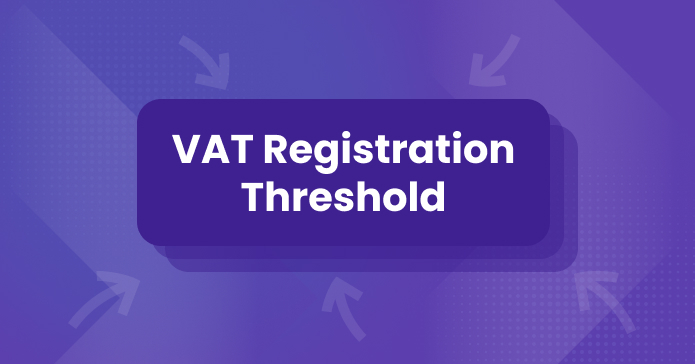A Comprehensive Guide for Small Business Owners
If you’re a small business owner, run a limited company, or just navigating the world of taxes, understanding VAT registration is super important. Whether you’re starting out or growing your business, knowing when to register for VAT and how it impacts your business can save you headaches and even open up financial opportunities.
In this guide, we’ll break down the VAT threshold for 2024, walk you through
- VAT register Threshold
- VAT Registration Process
- Tackle some of the most common questions.
Let’s make VAT a little less daunting and help you make smart decisions for your business!
What Is the VAT Registration Threshold?
The VAT registration threshold is the point when a business has to register for VAT with HMRC. It’s all about your annual VAT-taxable turnover—basically, the total value of your sales that are subject to VAT.
If your business’s taxable earnings go over the threshold in any rolling 12-month period, or if you think they’ll exceed the limit in the next 30 days, it’s time to register for VAT.
Key points to remember:
- The 12-month duration doesn’t need to align with the fiscal year—it’s a rolling period.
- Staying updated on your VAT-taxable turnover regularly helps you comply with VAT rules.
Interestingly, businesses with turnover below the threshold can voluntarily register for VAT for added financial and professional benefits, which we’ll explore further below.
What Is the VAT Threshold for Small Businesses in The Current Tax Year?
The VAT threshold for 2024 is set at £90,000 for annual VAT-taxable turnover. This figure has remained stable since 2017, offering consistency for business owners.
What this means for your business:
- If your turnover surpasses £90,000, HMRC mandates VAT registration.
- For those below the threshold, registration is optional. This can be advantageous, particularly if most of your customers are VAT-registered businesses.
Benefits of Voluntary VAT Registration
Even if your turnover is below the VAT threshold, registering voluntarily can have its perks:
- Claim Back VAT: You can get back VAT on eligible business expenses—even on purchases from up to four years ago if you’re still using them.
- Boost Your Credibility: Having a VAT registration number can make your business look more professional and established to clients and partners.
Common VAT Questions Answered
Do I Only Pay VAT Beyond the £90,000 Threshold?
No. Once you’re VAT-registered, you charge VAT (usually 20%) on all applicable sales—not just the turnover above £90,000. This VAT is then collected and paid to HMRC.
However, you’ll also be able to reclaim VAT on eligible business expenses, which can reduce how much you ultimately owe.
Can I Run Two Businesses to Avoid VAT?
Running two businesses to avoid VAT registration by splitting your turnover may be seen as “artificial separation” by HMRC. If caught, HMRC can combine the turnover of your businesses and apply VAT penalties.
To avoid legal complications, speak with a tax advisor before attempting such strategies.
What Will the VAT Threshold Be in 2024/25 Tax Year?
As of now, the VAT threshold remains at £90,000 for registration and £88,000 for deregistration (if your taxable turnover falls below this amount). HMRC has not announced any planned changes to this threshold for 2025.
Choosing the Right VAT Scheme for Your Business
Beyond meeting the VAT threshold, selecting an appropriate VAT scheme is crucial to managing costs and compliance effectively. Here’s a breakdown of common VAT schemes and their thresholds:
| Scheme | Threshold to Join | Threshold to Leave |
| Flat Rate | £150,000 or less | More than £230,000 |
| Cash Accounting | £1.35 million or less | More than £1.6 million |
| Annual Accounting | £1.35 million or less | More than £1.6 million |
Suggested VAT Options Based on Your Business Needs
| Turnover | VAT-Taxable Expenses | Client Type | Recommended VAT Option |
| Less than £90,000 | Less than 1.5% of turnover | Mostly non-VAT registered clients | Don’t register for VAT |
| Any | More than 1.5% of turnover | Mostly VAT-registered clients | Register for standard-rate VAT |
| More than £90,000 | Less than 1.5% of turnover | Any | Register for Flat Rate VAT |
These options allow flexibility for businesses to align VAT processes with their financial and operational needs.
Practical Tips for VAT Compliance
Keep an Eye on Your Turnover
Use accounting software to regularly check your 12-month turnover. Spotting when you're getting close to the VAT threshold early can save you from penalties for late registration.
Know What’s VAT-Taxable
VAT applies to most goods and services, but some are exempt (like health services) or zero- rated (like kids’ clothes). Understanding what counts as VAT-taxable will help you calculate your turnover more accurately.
Stay on Top of Your Records
HMRC expects you to keep detailed records of VAT invoices, purchases, and returns. Using digital tools can make recordkeeping easier and keep you ready for any audits.
Get Help from a VAT Pro
VAT rules can be tricky! A tax advisor or VAT specialist can save you time, help avoid mistakes, and even find ways to save money.
Why VAT Matters for Small Businesses
If you are not making more than 85K a year why would you worry about VAT as a small business owner? That`s because even if your revenue is below the VAT threshold, staying informed about VAT ensures you're prepared for future growth. Once your turnover exceeds £90,000, registration becomes mandatory, and not being ready can lead to penalties or compliance issues.
Additionally, VAT registration can be advantageous—allowing you to reclaim VAT on business expenses and project a more established business image. Being proactive with VAT knowledge helps you avoid surprises and gives you an edge in financial planning. Always consult a VAT expert to ensure you're maximizing benefits while staying compliant.
Take Control of Your VAT Obligations
Navigating VAT rules doesn’t have to be daunting. By staying informed about the VAT threshold for the current tax year and understanding your registration options, you can ensure your business stays compliant while leveraging VAT to support growth.
If you’re unsure about your VAT position or need professional guidance, consider consulting a tax expert or accountant to help you make confident, informed decisions.













